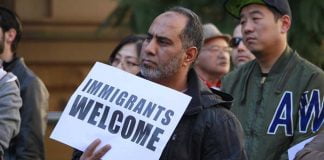THE REVIEW into the intervention in the Northern Territory, released in mid-October, has called for an end to blanket welfare quarantining and suggested the reinstatement of the Racial Discrimination Act (RDA).
This provides vindication for Aboriginal people on “prescribed areas”, and campaigners around the country, who have consistently argued that intervention measures have nothing to do with improving community welfare.
But these concessions, a response to mounting criticism of the intervention, would not remove the intervention’s approach of blaming Aboriginal people for the problems in their communities and stripping away any control by Aboriginal communities over their own affairs.
They also do not challenge the underlying government strategy of “population concentration”, putting pressure on people living in remote communities deemed “unviable” to move into major towns and urban centres.
Instead of blanket welfare quarantining of all Aboriginal people in prescribed communities the proposal would see quarantining restricted to those who break behavioural requirements, such as prescribed levels of school attendance for their children.
These proposed changes follow the model of the Family Responsibilities Commission being trialled in Queensland (see box).
But the problem with quarantining is not simply that it penalises responsible as well as “irresponsible” parents. Mandating that half of a person’s welfare money be spent at particular stores ignores the high cost of food in remote communities and shopping patterns where families drive hundreds of kilometres once every few weeks to buy food in town.
As a result quarantining has led to people being unable to spend money, and going hungry.
It is also a punitive approach which has caused a “loss of dignity and disempowerment of Indigenous people” according to the Indigenous Doctor’s Association. It takes resources away from the delivery of vital social services that could support people facing hardship.
For the RDA to be reinstated, the government would also have to hand back its compulsory five-year leases taken over Aboriginal townships. The leases are part of the intervention’s efforts to strip away control over communities from Aboriginal people. They allow the government to demolish, repair or construct whatever buildings on the land they choose without the need to consult the community.
The proposed softening of intervention measures is a response to the volume of review submissions criticising the intervention, and the evidence that the policies are causing havoc for Aboriginal communities in the Northern Territory and failing to address poverty and abuse.
It is unlikely that the federal government will move to implement any changes the review board recommends quickly. In fact, according to The Australian, Jenny Macklin’s office caused the delay in releasing the review report after it found out about its proposal to relax welfare quarantining.
Whatever the result the paternalist model for dealing with Aboriginal communities that is behind the intervention is not set to change. If the government ends up softening elements of the intervention, that is no reason to soften our opposition to it.
By James Supple





